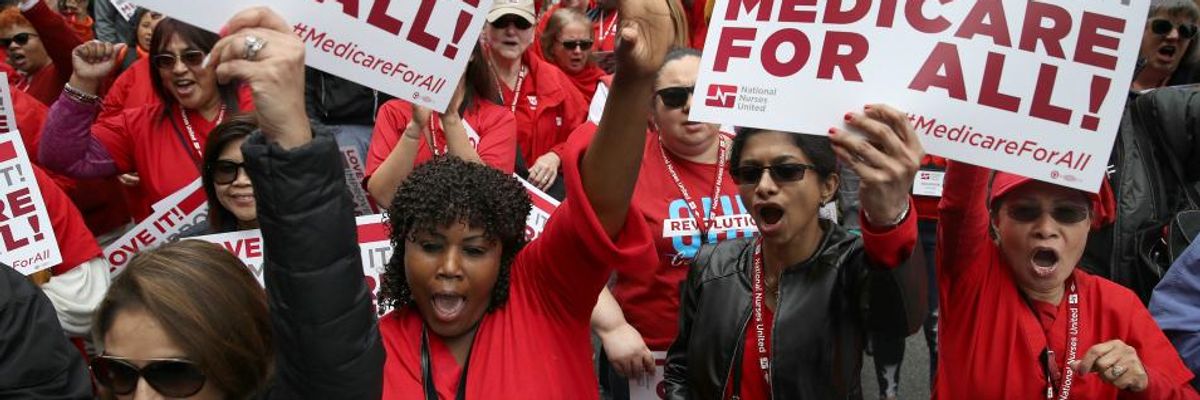A survey released Wednesday found that right-wing talking points against Medicare for All lose their effectiveness when met with a clear progressive counter-argument.
The YouGov/Progressive Change Institute poll (pdf) first asked voters straightforwardly whether they support or oppose "a 'Medicare for All' healthcare system, where all Americans would get their health insurance from the government."
Fifty-one percent of respondents said they support Medicare for All and 38 percent said they oppose it.
"I hear every single day from the insurance companies and the drug companies, 'People love their health insurance companies.' That is not true. People do not love their health insurance companies."
--Sen. Bernie Sanders
Support for Medicare for All fell significantly, though, when the survey next incorporated right-wing framing into the questions.
Asked if they would support or oppose "a national Medicare for All plan if you heard that it would require 180 million Americans to move from private insurance to the Medicare for All plan," 38 percent of respondents expressed support while 44 percent said they oppose the policy.
And when the survey framed Medicare for All as a tax increase on American families--as CNN moderator Jake Tapper did during the 2020 Democratic presidential debate Tuesday night--just 41 percent of respondents said they would support it and 46 percent expressed opposition.
But support for Medicare for All jumped back up when the survey paired the right-wing talking points with a strong progressive response.
"Some say it would require 180 million Americans to move from private insurance to the Medicare for All plan," the poll reads. "Others say that people don't actually love their insurance companies, they love their doctors. And under Medicare for All you would always have healthcare, even if you are fired or switch jobs--and you would be able to go to any doctor you want."
"Hearing these two arguments," the survey asked, "would you (support or oppose) Medicare for All?"
After viewing the progressive response, 52 percent of respondents said they support Medicare for All and 35 percent said they oppose it.
The same jump occurred when the framing of Medicare for All as a tax increase was countered with the progressive argument that Americans would "pay a premium to the government that is less than what you pay for healthcare now, and you would wind up with more money in your pocket overall."
Fifty percent of respondents said they would support Medicare for All after hearing the progressive response to the right-wing framing, compared to 41 percent without the progressive response.
Mike Casca, co-founder of MVMT Communications--a progressive consulting firm created to help Democratic primary challengers overcome the DCCC blacklist--said the "bottom line" of the survey is that "right-wing attacks aren't effective when we rebut them forcefully."
"We can win this battle and guarantee healthcare as a human right," tweeted Casca, "but we need a nominee who is going to fight hard for Medicare for All."
Sen. Bernie Sanders (I-Vt.), a 2020 Democratic presidential candidate and the lead sponsor of the Medicare for All Act of 2019 in the Senate, cited the survey in an interview on MSNBC's "Morning Joe" Thursday morning.
"The difficulty of polling is obviously how you phrase it," said the Vermont senator. "But if you phrase the question to say: would you be supportive of an expansion of Medicare to cover all of our people, where you have freedom of choice--which my bill does--in terms of the doctor or the hospital that you go [to], where there [are] no co-payments, no deductibles, no out-of-pocket expenses, but you will pay more in taxes, the answer is people do support that proposal."
"Now, I hear every single day from the insurance companies and the drug companies, 'People love their health insurance companies.' That is not true," said Sanders. "People do not love their health insurance companies."
In response to the argument that Medicare for All would force people off their insurance, Sanders said tens of millions of Americans lose their private insurance plans each year under the current for-profit system.
"When we have Medicare for All," said Sanders, "you will have far more stability than you currently have."




